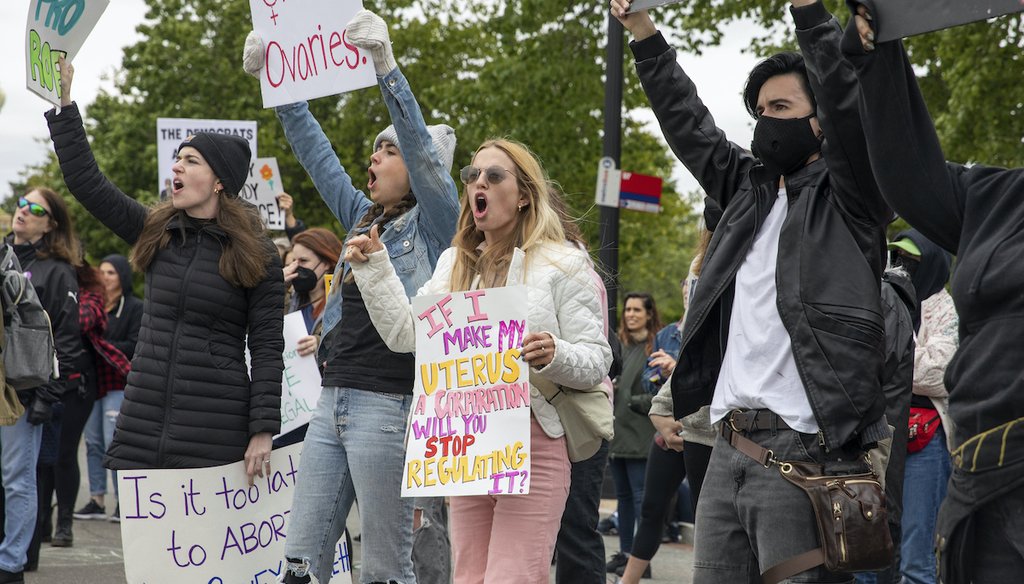Get PolitiFact in your inbox.

bortion-rights protesters hold signs during a demonstration outside of the U.S. Supreme Court in Washington, Sunday, May 8, 2022. (AP)
If Your Time is short
-
A 1950 statute prohibits picketing or parading in front of a courthouse or judge’s home with the intent to obstruct justice or influence a judge.
-
Legal experts generally agree that targeted, stationary protests outside of a judge’s home are prohibited under this federal law, but whether recent demonstrations related to abortion are considered illegal would be up to a court’s interpretation.
Abortion protests have erupted across the country since a leaked Supreme Court draft opinion suggested Roe v. Wade may be overturned. With more demonstrations expected in the nation’s capital, some Republicans have called into question the legality of protesting outside of justices’ homes.
Conservative political commentator Bill O’Reilly raised the issue during a May 11 segment of his show, "No Spin News." He played a clip in which White House Press Secretary Jen Psaki said the abortion rights protests have been peaceful.
"She’s justifying the violation of federal law, saying oh they’re peaceful so it’s okay. They can go to the Supreme Court justices’ houses. It’s not okay. It’s against federal law," O’Reilly said.
We wanted to look into that.
Legal experts generally agree that targeted, stationary protests outside of a justice’s home are prohibited under federal law — an effort to protect judges from undue pressures or influence.
Sign up for PolitiFact texts
Whether they are illegal is up to a court’s interpretation. Experts also warn that interpreting the law too broadly could infringe upon a person’s First Amendment right to peaceably assemble.
The federal law O’Reilly claims these protestors have violated is Title 18, Section 1507 of the U.S. Code, which was enacted in 1950. Under this law, it is illegal to picket or parade in front of a courthouse or a judge’s home "with the intent of interfering with, obstructing, or impeding the administration of justice, or with the intent of influencing any judge."
Individuals found in violation of this law could be fined, sentenced to up to one year in prison, or both.
"Targeted, stationary protest, solely and directly in front of a justice's home, with the intention of influencing that justice’s opinion on a vote, could constitute a violation of Section 1507," said Vera Eidelman, staff attorney with the ACLU Speech, Privacy and Technology Project, in an interview with PolitiFact.
But claiming this section prohibits all protests in a justice’s neighborhood or that it bans people from marching past a justice’s home would be too broad of an interpretation, Eidelman said.
"That reading would unconstitutionally limit people’s ability to protest in traditional public forums, including streets and sidewalks, and it would restrict our ability to communicate our messages of dissent, disgust, and disappointment to the public," she said.
In the past, the Supreme Court has addressed bans on residential protests. For example, in the 1988 Frisby v. Schultz case, the Supreme Court upheld a Wisconsin law that banned targeted picketing outside of a person’s home.
In this case, the court’s concern was that a broader ban on mobile protests through residential neighborhoods would restrict too much protected speech and assembly, Timothy Zick, a constitutional law professor at William & Mary Law School, told PolitiFact.
"It’s also possible, given that not only residential privacy but also concerns about the administration of justice are involved, that a court would allow a broader restriction on protests near justices’ (and judges’) homes," he said.
O’Reilly isn’t the only Republican decrying these protests. On May 11, GOP Sen. Chuck Grassley of Iowa sent a letter to the Justice Department calling on Attorney General Merrick Garland to enforce this picketing statute.
"It is beyond dispute that far-left activists have launched a concerted and coordinated effort to intimidate the Court into changing the draft Dobbs decision," Grassley wrote in the letter, referring to the case being considered by the Supreme Court that asks if Mississippi’s 15-week abortion ban is constitutional.
Republican Govs. Larry Hogan of Maryland and Glenn Youngkin of Virginia also sent a joint letter to the DOJ calling on Garland to "provide adequate resources" to keep the Supreme Court justices safe.
While the DOJ has not yet commented directly on the protests, spokesperson Anthony Coley said on May 11 that Garland "continues to be briefed on security matters related to the Supreme Court and Supreme Court justices."
The attorney general has also directed the U.S. Marshals Service to assist the Marshal of the Supreme Court and the Supreme Court Police in ensuring the justices’ safety.
Our Sources
Bill O’Reilly, Facebook video, May 11, 2022
Cornell Law School’s Legal Information Institute, "Title 18, Section 1507 of the U.S. Code," accessed May 13, 2022
Email interview, Eva Lopez, media spokesperson, ACLU, May 13, 2022
Email interview, Timothy Zick, constitutional law professor, William & Mary Law School, May 13, 2022
Chuck Grassley, "Grassley Calls On Justice Dept. To Enforce Law & Protect Justices As White House Remains Muted On Threats To Supreme Court," May 11, 2022
Larry Hogan, Twitter post, May 11, 2022
Department of Justice, "Justice Department Statement regarding Supreme Court Security," May 11, 2022
Oyez, "Frisby v. Schultz," accessed May 13, 2022
Oyez, "Dobbs v. Jackson Women's Health Organization," accessed May 13, 2022
The Washington Post, "Yes, experts say protests at SCOTUS justices’ homes appear to be illegal," May 11, 2022
CNN, "Republicans claim a 1950 law makes Roe protests at justices' homes illegal. Here's what to know," May 13, 2022
Politico, "GOP governors call on DOJ to 'enforce the law' as protesters gather outside justices' homes," May 11, 2022




























